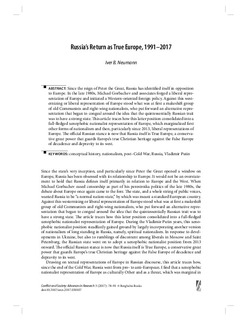| dc.contributor.author | Neumann, Iver Brynild | |
| dc.date.accessioned | 2018-08-02T07:41:19Z | |
| dc.date.available | 2018-08-02T07:41:19Z | |
| dc.date.created | 2017-10-02T14:26:02Z | |
| dc.date.issued | 2017 | |
| dc.identifier.citation | Conflict and society: Advances in research. 2017, 3 (1), 78-91. | nb_NO |
| dc.identifier.issn | 2164-4543 | |
| dc.identifier.uri | http://hdl.handle.net/11250/2507223 | |
| dc.description.abstract | Since the reign of Peter the Great, Russia has identifi ed itself in opposition to Europe. In the late 1980s, Michael Gorbachev and associates forged a liberal representation of Europe and initiated a Western-oriented foreign policy. Against this westernizing or liberal representation of Europe stood what was at fi rst a makeshift group of old Communists and right-wing nationalists, who put forward an alternative representation that began to congeal around the idea that the quintessentially Russian trait was to have a strong state. Th is article traces how this latter position consolidated into a full-fl edged xenophobic nationalist representation of Europe, which marginalized fi rst other forms of nationalism and then, particularly since 2013, liberal representations of Europe. Th e offi cial Russian stance is now that Russia itself is True Europe, a conservative great power that guards Europe’s true Christian heritage against the False Europe of decadence and depravity to its west. | nb_NO |
| dc.language.iso | eng | nb_NO |
| dc.title | Russia’s Return as True Europe, 1991–2017 | nb_NO |
| dc.type | Journal article | nb_NO |
| dc.type | Peer reviewed | nb_NO |
| dc.description.version | acceptedVersion | nb_NO |
| dc.rights.holder | This is a post–peer-review, precopyedited version of an article published in Conflict and society: Advances in research. The definitive publisher-authenticated version, Neumann, I. B. (2017). Russia’s Return as True Europe, 1991-2017, Conflict and Society, 3(1). Retrieved Feb 27, 2018, is available online at: http://dx.doi.org/10.3167/arcs.2017.030107 | nb_NO |
| dc.source.pagenumber | 78-91 | nb_NO |
| dc.source.volume | 3 | nb_NO |
| dc.source.journal | Conflict and society: Advances in research | nb_NO |
| dc.source.issue | 1 | nb_NO |
| dc.identifier.doi | 10.3167/arcs.2017.030107 | |
| dc.identifier.cristin | 1501459 | |
| dc.relation.project | Norges forskningsråd: 250419 | nb_NO |
| cristin.unitcode | 7471,18,0,0 | |
| cristin.unitname | Utenrikspolitikk og diplomati | |
| cristin.ispublished | true | |
| cristin.fulltext | original | |
| cristin.qualitycode | 1 | |
| dc.date.embargoenddate | 2020-06-01 | |
